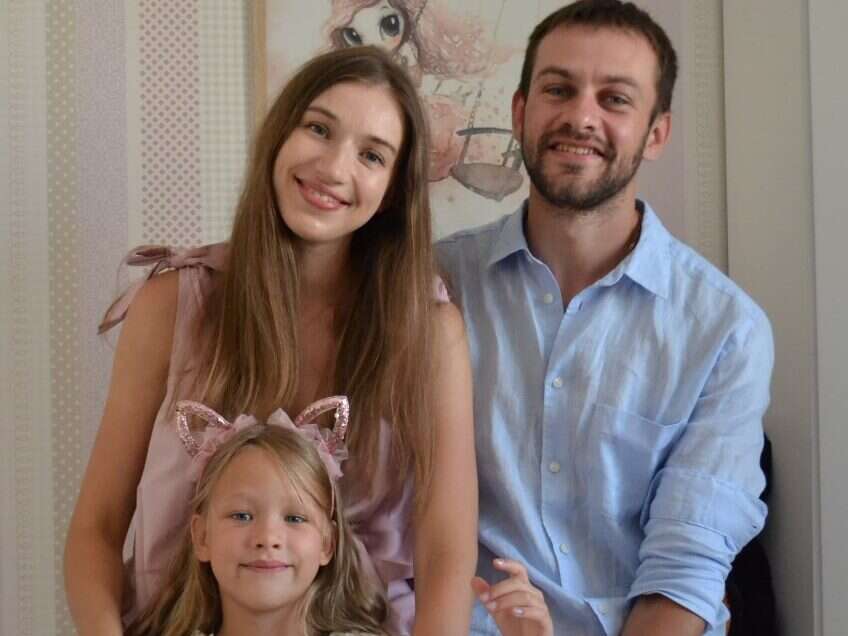
Before Ukraine became synonymous with war and suffering, it had a thriving technology scene with accompanying specialist media. Press Gazette spoke to staff at Creators Media Group, the country’s largest publisher of technology news websites, to find out what happened to them when Russian tanks began to roll into Ukraine.
Vera Chernysh, the chief executive of Creators Media Group, started her company as a blog five years ago. By February 2022, she owned three tech news websites with a monthly readership of 4m and employed 40 staff. Before the Russian invasion, Vera says CMG was on course to double its revenues this year to more than €1m.
“On 24 February, I woke up at 5 in the morning with my accountant calling, crying, saying: ‘Vera, the war’s started and we won’t receive any money today.’”
On the same morning, Viktoriia Pushkina, a reporter for CMG’s coding news website Highload, awoke to warfare on her doorstep in Kharkiv. Last Monday, she arrived in the Czech Republic as a refugee. She doesn’t know whether her home still exists and she’s unsure of when she’ll be able to return to Ukraine to see her boyfriend and family members who were left behind.
Volodymyr Skripin, the deputy editor-in-chief of ITC.ua, was kept awake for days as air sirens blared through the night in Rivne, western Ukraine. Along with his wife and seven-year-old daughter (all pictured above) he has become accustomed to spending nights in a shelter under their apartment block.
To date, Creators Media Group and its websites have remained operational. Viktoriia and Volodymyr have not dropped their workrate, and have continued to file stories – all of them now about war – for their specialist audiences. Vera says she paid salaries early after the 24 February invasion because she was aware that some would need money to flee their homes and country.
But, with the Ukrainian economy frozen and advertising budgets non-existent, the company cannot stay afloat for long.
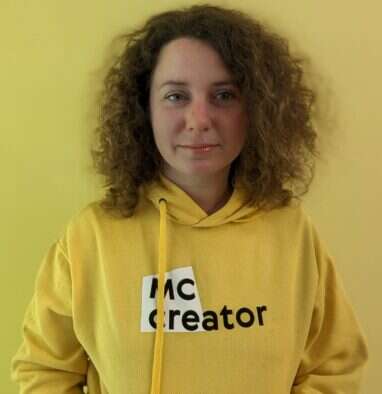
Vera (pictured left) last week launched a crowdfunding page to raise emergency funds to support her staff and keep her startup company operational.
She is hopeful that the war will end in April, but says her company needs €300,000 to stay afloat and pay staff their wages for six months before the Ukrainian economy can reboot. She believes her websites can play an important role in Ukraine’s economic recovery by seeking to inspire and support the technology sector.
Below, Press Gazette tells the stories of Viktoriia, Volodymyr, Vera and their colleagues – media workers like you and me, who found themselves in the path of Vladimir Putin’s war machine.
Viktoriia Pushkina, reporter, Highload
On 23 February, Viktoriia Pushkina, 24, filed a story on burnout, imposter syndrome and mental health in the Ukrainian IT sector.
The following morning, she and her boyfriend, Viacheslav, a 25-year-old chef, woke up in a warzone. They lived in the Pivnichna Saltivka district of Kharkiv, close to the Russian border.
“The first day of the war, we woke up because we heard something,” she recalls 20 days later over a Teams call from the spare bedroom of a Czech home nearly 2,000km away from home. “It was very loud. I remember that I thought for one second it was rain or something. But the next second, I understood that this is something scarier.
“I remember the first few hours. We didn’t understand what to do next. We just sat in and read news and spoke with our friends and relatives to understand what was going on and whether we can leave our home or not.”
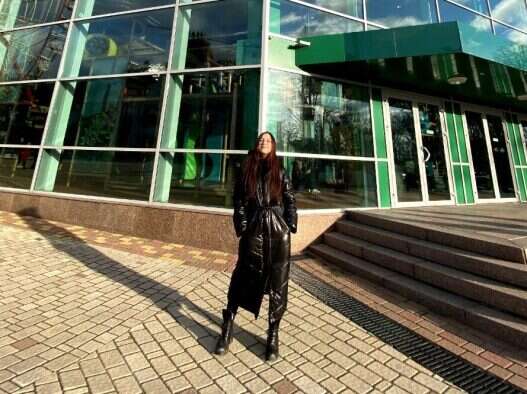
Viktoriia pictured near Gorky Park in Kharkiv on 20 February. She said: “My sister and I were walking in Gorky Park, riding the ferris wheel, looking at our beautiful city and not knowing that four days later they would start to destroy it.”
After establishing that it was at least safe to leave their home, the couple traveled into central Kharkiv to stay in a two-storey apartment with Viktoriia’s sister, her sister’s boyfriend and his family. Viktoriia says there were ten of them overall, including a two-month-old baby.
Viktoriia considered this apartment to be safer than her own because it was further from the Russian border. But she and her family were constantly on edge. They each slept in the corners of rooms after Viktoriia read an article that said being adjacent to two walls was safest in the event of an explosion.
One day, she says, “there was news about a bomb on a central square in Kharkiv. It was very scary. On all of those days, I was like very unemotional. I don’t know, I’ve always tried to be strong and calm and just do what I have to do to be safe and to protect my family. But after that I had a panic attack or something. I cried a lot.”
One night, she was woken by the sound of her sister’s boyfriend dropping his phone. “I woke up and just ran,” says Viktoriia. “I don’t know where. I don’t even remember whether I was conscious in this moment. It was just the reaction of my body. You hear a loud sound and you run. And after a minute my sister explained to me everything was fine, you can sleep.”
Russian troops entered Kharkiv on 27 February. In the following days, shelling killed and injured dozens of people, and areas of the city crumbled.
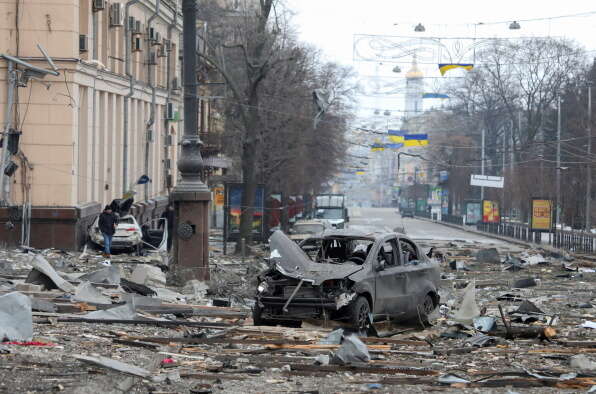
This photo, taken on 1 March 2022, shows an area of central Kharkiv near the regional administration building, which city officials said was hit by a missile attack. REUTERS/Vyacheslav Madiyevskyy
On 4 March, Viktoriia, her boyfriend and the family they’d been staying with decided to leave Kharkiv for the city of Kremenchuk, a three-and-a-half-hour drive south west towards the centre of Ukraine.
Viktoriia’s 59-year-old father chose to remain in Kharkiv. “We talked with him many, many times. We offered him to live with us when we left for Kremenchuk because we had a place in the car,” she says. “But he’s just very stubborn. He says that maybe Kharkiv is not a safe place for him, but also it’s his home.”
Viktoriia and her group, traveling in a three-car convoy, stayed in Kremenchuk until 11 March and then Vinnytsia for one night on the way to Ivano-Frankivsk, a 12-hour drive to the west, for another night.
Despite no longer being close to the Russian border, they did not feel safe. “I think anywhere in Ukraine – even if there are no street fights and no Russians – you can’t feel safe,” says Viktoriia. “Because of these rockets and bombs. Because they can fly anywhere.”
Viktoriia and her sister made the difficult decision to flee Ukraine with other family members who were able to leave the country. Their boyfriends, as men aged between 18 and 60, did not have a choice.
Viktoriia’s boyfriend, Viacheslav, planned to drive her to the Slovakian border. But his car broke down along the way. “It was very sad,” she says. “I understood that he couldn’t cross the border with me. But I thought that I had one more day with him. And then suddenly, in the middle of a road, my relatives told me that I just needed to take my baggage and move to their car. And he just had to stay here and repair his car. So it was very fast.”
Viacheslav is currently living in Ivano-Frankivsk with friends. He is looking for work – restaurants have closed down – and has registered to fight with the Ukrainian army if and when civilians are required.
Viktoriia and her sister crossed the border into Slovakia on Sunday 13 March. They were dropped off in the Czech Republic the following day. The rest of their group had a place to stay in the Netherlands.
Viktoriia and her sister were granted one-year visas to live and work in the Czech Republic and were allocated a family to stay with in the small village of Albrechtice nad Orlici, which is 90 minutes east of Prague. “We’re very lucky because we have a separate room, we have our own bath and people here are actually very, very nice.”
Viktoriia left her home on 24 February with a rucksack containing a few changes of clothes, shampoo, some personal documents and her work laptop.
Throughout her arduous journey across Kharkiv, Ukraine, Slovakia and the Czech Republic, Viktoriia has continued to file stories for Highload, documenting how the war has affected her IT specialist readers and providing useful tips for staying connected during internet outages.
“It’s really strange,” she says. “A few days ago, I decided to check how much work I’ve done in these days. And before the war, I made about one article per day. And I counted how many articles I’ve done for these days, and it’s only two articles less compared with my usual.
“So I don’t understand how I did it. But I think every stable minute I was in Kharkiv – where we were not hiding and we had the opportunity and connection to the internet – even in the war I could think of some articles and topics I could cover. And actually, it’s the only thing that can keep you sane.
“I don’t have any usual things now. I have very little of my things. I don’t know if my home exists – maybe it’s just destroyed. But I have my work. And it feels really good when I’m writing and I’m concentrated, focused, on a story.”
Volodymyr Skripin, deputy editor-in-chief, ITC.ua
Volodymyr Skripin, 32, is the deputy editor-in-chief of ITC.ua, a specialist site for technology enthusiasts.
As a man aged between 18 and 60, Volodymyr is not allowed to leave Ukraine. His wife, Alina, 33, has chosen to remain with him in their apartment in Rivne, in the west of Ukraine, with their daughter, Anna, who is seven years old.
“We had a talk a few days after it all began,” he says over a Friday night Teams call from his apartment. “My wife refused to go anywhere without me. She says that it will be better to stay in a shelter – if it will need all day, all night – together.”
Volodymyr and his family spent Saturday night in a shelter underneath their apartment building as air sirens sounded through Rivne. He took this opportunity to email me photographs of his family (above) and some paintings (below) by his daughter, Anna.

A painting by Volodymyr’s daughter, Anna
Volodymyr says the situation in his city is “relatively calm”*. “Since the beginning of the war, we’ve had two or three air strikes,” he said on Friday. “One of the strikes was on the airport on 25 February, early in the morning. The distance between our flat and the airport is 15km, but we heard the strike very good.”
He adds: “The main inconvenience for us is sirens. We hear them a few times at night and they are very loud. We get used to this situation and try to live on. We sleep when it’s silent.
“The first days we didn’t sleep at night at all. It was very hard. My daughter often woke up. She said she was hearing sirens and bombs. She was very scared. Now it gets better.
“But morally it’s very difficult because there is a sense of guilt that thousands of people in eastern Ukraine and northern Ukraine are without homes.
“We are still getting reports of terrible things – deaths of children, about women, about violence – so it’s very hard morally.”
[*Update: After this article was published on Monday evening Ukrainian time, Volodymyr emailed to say that it was no longer “relatively calm” in Rivne. He said: “The situation is changing rapidly: from 1:00am until now at least six missiles arrived. Four of them were shot down by air defense, but two achieved their goal :(”]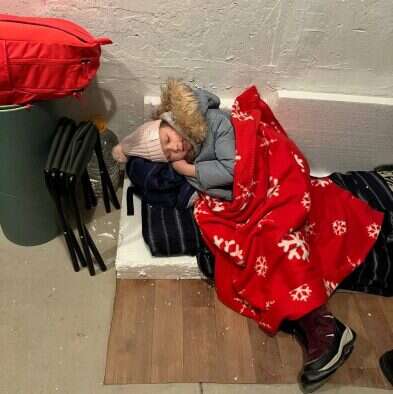
Volodymyr’s daughter, Anna, asleep in the shelter under their apartment building on Saturday night
Since Russia’s invasion, Volodymyr and his team’s coverage has focused on the war. “Today, Ukrainian people are not interested in smartphones, video cards, consoles and other things that were interesting and important before the war,” he says. “Now, we’re trying to write about some useful things that connect to technology. Like instructions – what to do, how we can transfer important information…
“We write about cyber-attackers, we write about different shelters, about internet in shelters, about communication with other regions, about how people help each other, where they can find interesting information to get to other countries.”
Volodymyr works with a team of around 15 at ITC. They are used to remote working, and are based in different cities across Ukraine, but team coordination has been heavily disrupted.
“We have chat texts and calls,” he says. “But now it’s not possible because we work from different cities. In one city the situation is better, in others it’s not so good.
“And the guys that work with me live in Kyiv, Odessa – they often have air strikes. So when they can come online, we text, we transfer some information and try to do something good for all of us. Trying to work, trying to go on.”
Vera Chernysh, chief executive, Creators Media Group
Vera Chernysh, 35, is the chief executive and co-founder of Creators Media Group. It owns Highload, ITC and a third title called MC.today, which she founded as a blog in 2017. She has lived in Portugal for the past four years.
“We grew like crazy for five years,” says Vera. “Unfortunately, I think for now in Ukraine everything is a bad business.”
Last year, she says CMG generated revenues of around €500,000. She expected this figure to more than double this year. CMG acquired ITC last year and had big plans for the publication this spring.
“We finished hiring and relaunching in February,” says Vera. “And we were supposed to launch a new design in March. And it’s like, ‘Yay, it’s so cool. we’re done with it!’ And then the war started.”
Vera held a company Zoom call on the morning of 24 February for those that were able to join.
“We said that our main job now is to be journalists,” she says. “So, to help people to tackle this. Because everybody has lots of questions and there is lots of news and we are professional journalists. So we have to do what professional journalists should do in times of war.
“So we started to publish lots of news, like fact-checking because there is lots of fake news. Also, we started to write lots of articles about how to hide from bombs in your apartment, how to survive during a chemical blast, and how to survive during gun shooting. Things that I would never think we would publish ever. But that’s what we thought we had to do.
“I just told them, ‘Okay, guys, you have to go and work because that’s your input to doing something good for the country.’ After that, they were all telling me, ‘Thanks a lot for that because I was absolutely in shock, I was sitting, crying, and you gave me a job to do and I stopped crying and started doing something because I thought that my life still matters.’”
Vera says she paid staff their salaries early “because I understood many had to escape, many had to leave their cities, had to buy tickets, had to find somewhere new to live, move to Europe”.
Before the war, CMG made its money through native advertising. Today, its native content writers instead cover news about Russia’s invasion.
Vera says her sites have also sought to highlight any businesses that are finding a way forward amid the crisis. “It’s very important for people to see that somebody is doing something. So if somebody is doing something, then I can do something. It motivates people.
“What we are afraid of in Ukraine is that we can win a battle in the field, our army, but our economy will be totally ruined. Because, can you imagine, on 24 February, the economy just stopped.”
CMG journalists’ war-focused content has led to a spike in traffic across the publisher’s sites, says Vera. The day before we spoke, she said, 500,000 unique users visited Highload, ITC or MC.today.
But, because all of the sites are free and dependent on advertising, revenues are not following. So far, CMG has been able to pay journalists their salaries. But Vera is concerned that this might not be enough for female employees who have been forced to flee Ukraine for other countries where the cost of living is higher.
“I have a team of 40 people,” she says. “Half of them moved to Europe, but they still have Ukrainian salaries.
“In Ukraine, a normal [monthly] salary of €1,000 is a good salary for a journalist. And in Germany, for €1,000, you can maybe rent a flat. Maybe. Or a room, and that’s all. And if you have kids – I have girls with kids who’ve moved there, so they don’t have money.
“So for me, the number one issue now is to find money to help these girls who moved Germany, to Poland, for them to settle down.”
What next?
Vera believes she will need €300,000 to cover her company’s costs for the next six months.
“Why half a year? It’s not that I think the war will last for half a year. I hope not. I actually think it will end faster… hopefully it will end in a month.
“But I understand that in a month our economy will still be ruined. Our country will still be ruined. Nobody will want to advertise. And everybody will think how to gather themselves together and find ways to live on.”
In the Czech Republic, Viktoriia says she is not allowing herself to look forward to the war ending soon. But equally, she is not prepared to accept that she’ll be away from her boyfriend, her family and her country for long.
“My heart is still in Ukraine. And I can’t just forget about it and just build a new life here.
“I’m very grateful that I have this job. And I understand that I don’t want to just quit and find a job in Czech or any European country, because at least I could make my effort as a journalist, a Ukrainian journalist, to provide some useful information for our readers and also to pay tax.
“I think it’s important to support in this way. I’m not a heroic volunteer, but at least I can do this. So I hope I can come back in a few months. But for now, in this unstable situation, all I can do is check this news every day, check this situation, and every day decide what I should do. Because in this situation we do not have the chance to plan and to think about the future.
“I can dream about the future. I can dream about how I meet my boyfriend, how we live in a new, beautiful Kharkiv. But it can’t be a plan. And you can’t have expectations. Because when you have expectations, you can be even more sad when they are not fulfilled.
“So for now, yes, I concentrate, I focus on this very day, and I think that’s my job – not only as a journalist but also as a person, as a girlfriend, as a sister – and I do every day what I can do.”
Volodymyr wants his life to return to normal – “so we can work, can smile and do our usual things” – but he is also aware of the financial difficulties facing his employer, his sector, and the Ukrainian economy.
“I hope that everything will be okay,” he says. “But if it will not be okay and I must find a new job. It will be a challenge for me, but 32 is not 50 or 60. If in our country, there will be peace, the job is not trouble. We will find jobs.
“I love my job and I hope that everything will be okay and I will return to my usual role in this company, in this team – and we can then write about space, about Elon Musk, about Microsoft, Apple and other companies that we wrote about before the war.”
But Volodymyr is also aware that if there is no fast resolution, and the war continues, civilians like him could be required to fight.
“We’re all scared about this scenario,” he says. “Especially that we do not have military experience.
“It’s our land and there is nowhere to run for us. Of course it’s a scary situation, and I don’t want to. But if I must, I will.”
Click here to donate to the Creators Media Group fundraising effort.
Email pged@pressgazette.co.uk to point out mistakes, provide story tips or send in a letter for publication on our "Letters Page" blog
